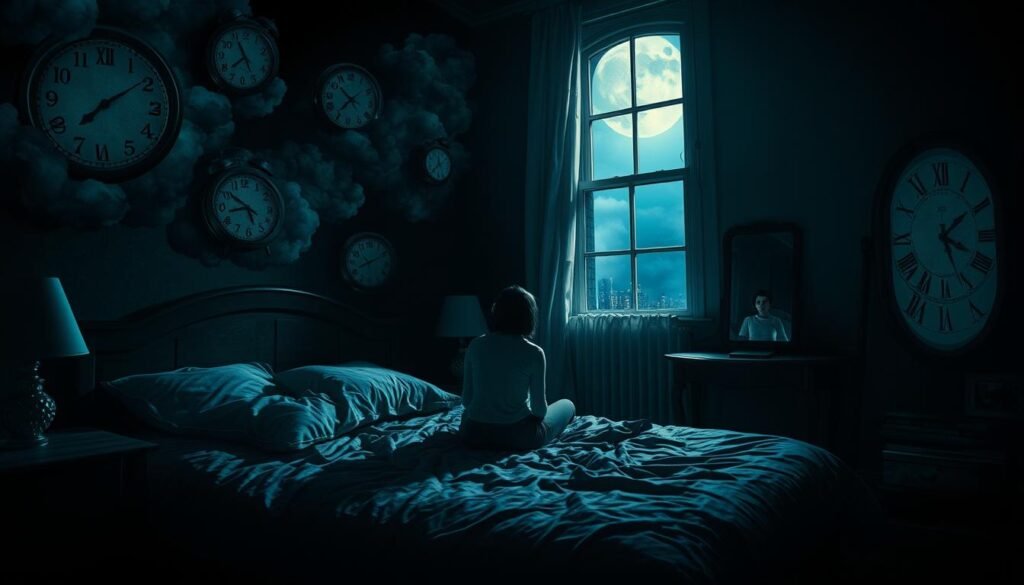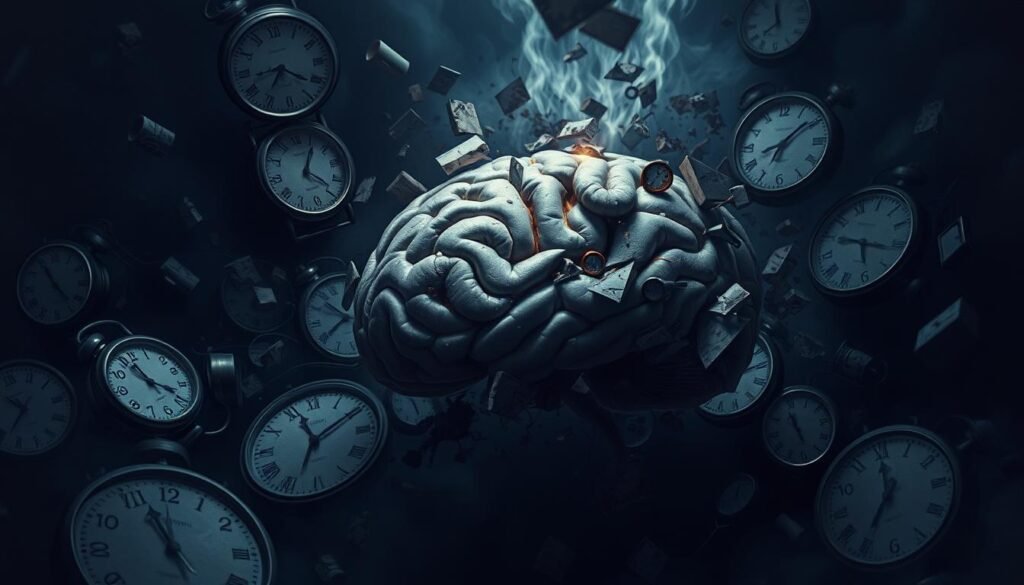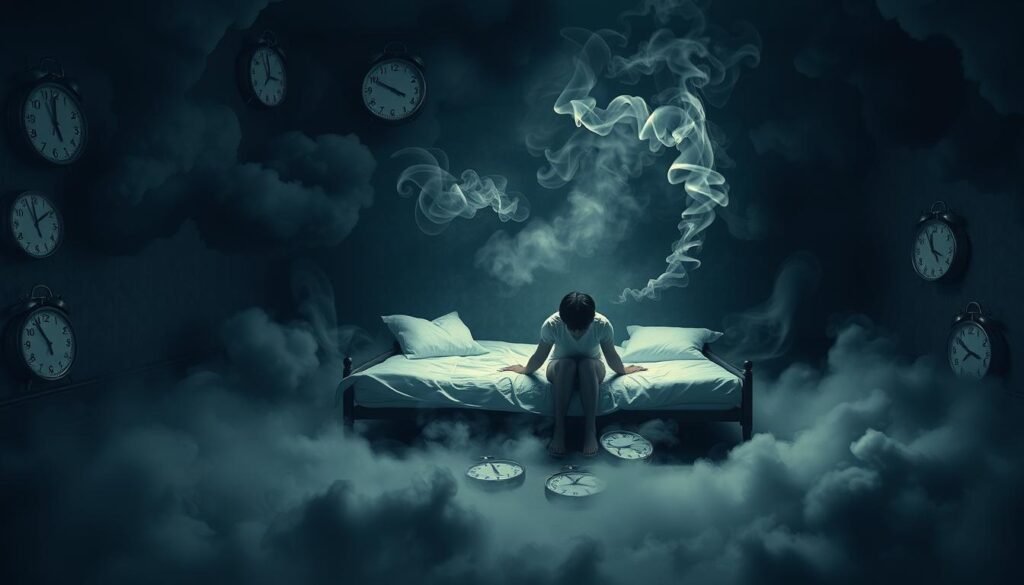About 30% of adults in the US struggle with insomnia. Of these, 10% face it chronically. These numbers show how common sleep problems are. Importantly, they can lead to bigger issues like anxiety, depression, and trouble thinking. It’s key to notice insomnia symptoms early. Doing so helps prevent these mental health problems and keeps you healthy.
Key Takeaways
- Untreated insomnia affects about 10% of adults chronically.
- Chronic sleep issues can lead to anxiety disorders and depression.
- Early recognition of insomnia symptoms is essential for mental health.
- Sleep deprivation has significant implications on cognitive function.
- Ignoring sleep issues can escalate mental health risks over time.
- Seeking treatment for insomnia can improve overall well-being.
Understanding Insomnia and Its Causes
Insomnia is a sleep issue where people have trouble falling or staying asleep. It can also cause someone to wake up too early. By learning about the Causes of Insomnia, you can find out how to sleep better. There are two main kinds of insomnia. Primary insomnia is its own problem, not caused by other health issues. Secondary insomnia happens because of other medical conditions or medications.
Different things lead to insomnia, such as:
- Lifestyle Factors: Stress, too much caffeine, and not having a regular bedtime can mess up your sleep.
- Medical Conditions: Problems like chronic pain, asthma, or mental health issues can make it hard to sleep well.
- Environmental Influences: Noises, lights, or being too hot or cold can stop you from falling asleep or staying asleep.
Understanding these factors helps in finding the best way to deal with insomnia. Both the Mayo Clinic and the National Institute of Mental Health say knowing about insomnia’s various causes is key. This knowledge helps people get the right help for better sleep.
| Causes of Insomnia | Examples | Potential Solutions |
|---|---|---|
| Lifestyle Factors | Stress, Caffeine Consumption | Relaxation Techniques, Sleep Hygiene |
| Medical Conditions | Chronic Pain, Anxiety Disorders | Consultation with Healthcare Providers |
| Environmental Influences | Noise, Light Disturbances | Sound Machines, Dark Curtains |
Sleep Deprivation Effects on Mental Health
Sleep deprivation harms mental health in many ways. Not sleeping enough can make people more irritable and stressed. This affects how they interact with others and make decisions. Lack of sleep can mess with hormone levels, like cortisol, making anxiety and mood swings worse.
Research shows that the effects of sleep deprivation go beyond being tired. Studies link not sleeping enough to worse mental health issues. The Journal of Clinical Sleep Medicine states that sleep is key to keeping emotions in check.
Dealing with insomnia? Pay attention to your mental health. Notice the signs of not getting enough sleep. This is the first step to getting better. With the right help, improving sleep habits can boost well-being.
Serious Mental Health Consequences of Untreated Insomnia
Untreated insomnia can lead to serious mental health issues. Sleep problems may result in Mood Disturbances like irritability and instability. It affects emotional health and can trigger severe mental conditions.
Impact on Mood Disturbances
Insomnia drastically affects mood. Sufferers may react strongly to stress with less ability to cope. These Mood Disturbances include emotional ups and downs. Treating insomnia helps reduce these issues and boosts mental wellness.
Connection to Anxiety Disorders
There’s a big link between insomnia and Anxiety Disorders. Those struggling with sleep issues often face a higher risk of anxiety problems. They might deal with non-stop thoughts, intense worry, and panic attacks. This affects daily life severely.
Link to Depression
The tie between insomnia and Depression is clear. Chronic insomnia sufferers are more prone to depression. Lack of sleep worsens feelings of despair. Understanding this connection shows why it’s critical to seek help. Treatments can vastly help mental health and lower risks of severe issues.

It’s important to see how sleep affects mental health. For more on insomnia’s effects, check resources like the Mayo Clinic.
Cognitive Impairment Due to Lack of Sleep
Not getting enough sleep can seriously mess with your mind. If you don’t sleep well, you might have trouble in day-to-day life. It’s important to know how missing sleep affects your memory, decisions, and how quickly you react.
Memory Problems
Getting enough sleep is key for keeping your memory sharp. If you skimp on sleep, remembering stuff becomes harder. Studies show without enough snooze time, our brains struggle to hold onto and recall information. This can make school or work tougher than it needs to be.
Decision Making and Reaction Time
Lack of sleep makes it hard to make good decisions. People not sleeping enough have slower reactions. This can make everyday tasks and important stuff like driving dangerous. Not getting enough rest can make you rush decisions or miss important details. Scientists tie sleep issues directly to not making good choices. Research in cognitive psychology backs this up, showing sleep affects our reaction times and how we make decisions.

To understand the big picture on how missing sleep affects your health, check this out at this source.
| Effect | Details | Impact |
|---|---|---|
| Cognitive Impairment | Reduced memory consolidation | Struggles to recall information |
| Memory Problems | Diminished capacity for memory recall | Difficulty in academic and work scenarios |
| Decision Making | Impaired judgment and reasoning | Higher likelihood of poor choices |
| Reaction Time | Notable delay in responses | Increased risk during activities like driving |
The Psychological Impact of Chronic Sleep Issues
Chronic sleep problems hit our mental health hard. They start a cycle of fear and anxiety about sleep. This worry loop can make sleeping even harder.

These problems can also make us think negatively. This leads to feelings of no hope. It can get hard to do day-to-day tasks. This affects mood and how we act every day.
Studies show that sleep problems get worse over time. They can lead to serious mental health issues. This includes big changes in who we are and, in severe cases, psychosis. Knowing about these impacts is key. It helps people and doctors find better ways to help.
| Psychological Effects | Symptoms |
|---|---|
| Increased Anxiety | Worrying about sleep quality, heightened stress reactions |
| Negative Thought Patterns | Feelings of hopelessness, self-doubt |
| Reduced Motivation | Difficulty initiating tasks, lack of enthusiasm |
| Personality Changes | Increased irritability, emotional instability |
| Severe Mental Health Issues | Risk of psychosis, depression |
Relationship Between Insomnia and Suicidal Ideation
Insomnia is now seen as a big factor leading to suicidal thoughts. Studies show a strong link between not sleeping well and mental health risks. These risks are especially high in people with major depressive disorder (MDD). Insomnia makes people feel more distressed. This can make them feel very hopeless and in despair.
Research tells us that people with insomnia are much more likely to think about suicide. Knowing how insomnia links to suicidal thoughts is key for helping people. One study found that patients with MDD and insomnia were 1.71 times more likely to attempt suicide. This information shows why doctors need to watch patients with both insomnia and suicidal thoughts closely.
Helping people sleep better can guard against suicide thoughts and actions. Early help can change things for the better for those in danger. Treating insomnia can help keep a person’s mental health stable.
Identifying the Mental Health Risks of Untreated Insomnia
It’s very important to spot the symptoms and signs of untreated insomnia. These issues can mess up sleep and hurt mental health if not treated. Signs like finding it hard to sleep, waking up a lot, and feeling tired all the time can point to this problem.
Recognizing Symptoms and Signs
There are several symptoms to look out for with untreated insomnia. Some common ones include:
- Difficulty concentrating
- Increased irritability
- Cognitive impairments
- Low energy levels during the day
Being aware of these signs is the first step to get help. If you notice these problems, check how you’re sleeping. Getting help early can stop things from getting worse. The Sleep Foundation has tools to help spot sleep issues.
The link between untreated insomnia and mental health is serious. Not sleeping well can make stress levels go up and lead to mental health issues. Knowing about the dangers of not getting enough sleep is key. Catching the problem early helps with treatment and improves health.
| Symptoms | Potential Consequences |
|---|---|
| Difficulty falling asleep | Cognitive impairment |
| Frequent night wakings | Increased anxiety |
| Daytime fatigue | Depression risk |
| Irritability | Social difficulties |
Research shows that dealing with sleep problems early is crucial. Taking action soon helps avoid serious effects of insomnia. This keeps both mind and body healthy.
Seeking Treatment Options for Insomnia
Treating insomnia involves many different methods. Cognitive-behavioral therapy for insomnia (CBT-I) is a top choice. It aims to change how people think about sleep and their sleep habits. This program helps people develop a positive view of sleep, improving their mental health.
For some, medication is needed to combat severe sleep issues. Doctors sometimes prescribe sleep aids along with therapy. It’s important to talk to a doctor to figure out what’s best for you. They help choose the right treatment, focusing on both symptoms and causes.
Lifestyle changes are key to fighting insomnia. It helps to have a regular sleep schedule, a calming bedtime routine, and less screen time before bed. The American Academy of Sleep Medicine offers great advice and resources. These changes can make a big difference in sleep quality and mental health.